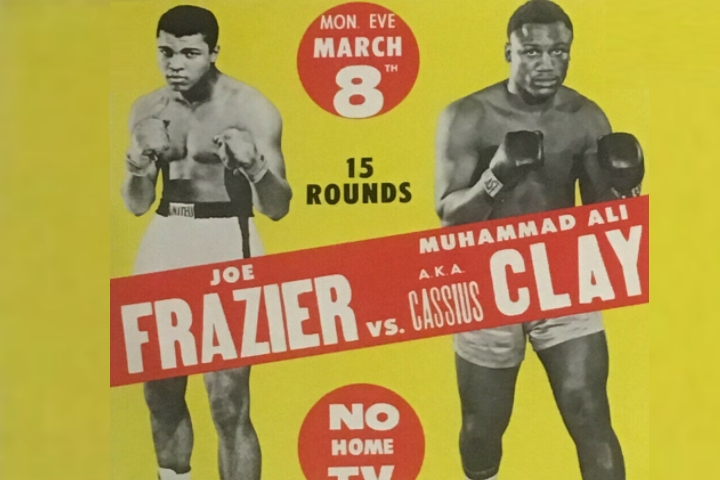Jerry Izenberg doesn’t hesitate when asked if we will ever see a night like the one that took place in New York City’s Madison Square Garden on March 8, 1971.
“No,” said the Hall of Fame writer for the Newark Star Ledger of the first bout between Joe Frazier and Muhammad Ali, a 15-round epic that is as fresh in his mind today as it was 50 years ago.
And it wasn’t just about what took place between the ropes that night, but the lead-up to the fight, its aftermath, and all the world events that had fans choosing sides for reasons other than the ability of the two unbeaten heavyweights to throw punches.
“The fight itself, I put it this way,” he said. “In 1938, (Max) Schmeling and (Joe) Louis, That was the last time I could think back and remember a fight as emotional as Ali-Frazier. Everybody thought Louis was fighting for America. Everybody thought Schmeling was fighting for Nazi Germany. The truth was, Schmeling, who I knew, was a pretty good guy. He had nothing to do with Hitler; he wanted to win back the title that he had lost. Louis remembered that Schmeling was the only guy that knocked him out and he really wanted to even that score.
“With Frazier and Ali, it was a similar thing,” Izenberg continues. “Frazier is pissed off because he didn't mind fighting the guy, because Frazier didn't mind fighting anybody, but there is all the stuff that Ali said about him, and Ali, because they took his title. They had other reasons for the fight, just like Schmeling and Louis. So Frazier and Ali were symbols. The pro-Frazier and the pro-Ali people were really pro-Vietnam War and anti-Vietnam War pretty much. Fight fans I don't put in that category, but they were in the minority because the whole country was involved.”
With tensions running so high in and out of the ring, it’s no surprise that the lead-up to the bout often got ugly, with Ali’s comments about Frazier hitting below the belt and adding to the intensity that we would ultimately see on fight night. Izenberg remembers Ali making a trip to Frazier’s gym in Philadelphia and calling “Smokin’ Joe” out in an effort to build the fight. Frazier was all-in for a pre-fight throwdown, but his manager and trainer Yank Durham wasn’t having it.
“Durham puts a headlock on him, throws him on a chair there and says, 'You sit there. The Fight of the Century is not gonna take place on a side street in front of a railroad station in Philadelphia. We're gonna make some money.'”
They would, each fighter getting $2.5 million, and when they showed up to fight, the Garden was packed with celebrities for an event that stopped the world for one night.
“Everybody had an opinion about it, and the emotion was enormous,” said Izenberg. “It was in New York, and the people with the money were there - the garment center people, the celebrities, all those people. It was a hundred fifty dollar ticket, which was huge then.”
Going in, Izenberg’s call on the fight was that it was “a toss-up, and it was the only one that was.”
But as the bout wore on, Frazier took control, and in looking back, the intensity from both fighters, but especially the champion, was something you rarely see.
“You don't expect that from heavyweights,” said Izenberg. “You expect somebody to get knocked out, and they're slow, most of them.”
Not on this night, with Frazier’s left hooks looking particularly ferocious as he punished “The Greatest.”
“Everything he ever threw hurt,” Izenberg said of Frazier, who used one of those left hooks to drop Ali in the 15th round. By then, the reporter believed Frazier already had the fight wrapped up, but after the unanimous decision was read, Ali and many of his followers had other ideas.
“Frazier goes to the hospital, Ali goes to the nearest talk show,” said Izenberg. “He's at all the late night talk shows and he now convinces America he won the fight and of course he didn't. And I know Frazier's burning about this.”
Soon, Izenberg was on his way to Philly to visit Frazier at his gym and get his take on the fight.
“The first thing I see is a floor to ceiling blow-up photograph of Ali on his ass and Joe walking to a neutral corner,” he laughs. “I said, ‘You didn't waste much time, did ya Joe?’”
The two then went to a local deli to grab some sandwiches when three kids came running down the hill.
“They’re yelling ‘Joe Frazier, Joe Frazier,’” Izenberg recalled. “He gives them autographed pictures and says, ‘Listen, don't hurt nobody, stay in school.’ Suddenly, one of the little kids looks at him and says, 'My daddy says Muhammad Ali was drugged.' Frazier gets down on the ground on his knees so he can be face-to-face with this kid. He says, ‘You go home and you tell your daddy that he's absolutely right. Muhammad Ali was drugged. I drugged him with three left hooks in a row, just like this.’ He throws a left hook in the air and the three kids take off. Joe tell me, ‘You know I won the fight. What the hell I gotta do to get outta that guy's shadow?’ And he lived his whole life in it.”
Maybe to some, but to those who know the sport and those who shed their blood, sweat and tears in it, Frazier’s legacy as one of the greats was secured the moment he defeated Ali 50 years ago. And no one can deny that victory of all victories.
For more stories on Frazier, Ali and the greats of the heavyweight division, pick up Izenberg's book, “Once There Were Giants,” now in paperback. To order, visit https://www.amazon.com/gp/aw/d/1510759980/


ADD COMMENT VIEW COMMENTS (2)